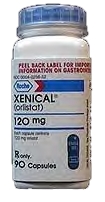 |
In our efforts to provide you with the most comprehensive site possible, we have included various articles relating to Xenical. |
Wadden, Thomas A.; Van Itallie, Theodore B.; Blackburn, George L. Responsible and irresponsible use of very-low-calorie diets in the treatment of obesity, JAMA, The Journal of the American Medical Association v263, nl (Jan 5, 1990):83 (2 pages).
Oprah Winfrey's experience of losing 67 lbs in only four months by the use of a medically supervised very-low-calorie diet used in the 1970s and were associated with a large number of deaths. In general these diets were used by individuals who were not under the care of a physician, and were dificient in protein and other essential vitamins and minerals. Athough the present version of very-low-calorie diets contains essential nutrients with high-quality protein, and are much safer than their predecessors, they should only be used by individuals who are severely obese and only when under strict medical supervision. These diets provide between 400 to 800 calories/day and are designed to cause the greatest weight loss possible without a significant effect on the lean (muscle) mass of the body. These diets provide between 45 to 100 grams per day of protein (30 grams equal to one ounce) which is contained in a powder derived from egg or milk products. The diet powder is stirred into water and consumed three to five times per day. In some forms of this diet portions of lean meat, fish or fowl are also included in the daily food intake. Dieters also take supplements of vitamins, minerals and drink at least 2 liters of water or non-caloric fluid per day. An average woman will lose approximately 1.5 kg/week and a man 2.0 kg/week (1 kilogram is equal 2.2 lbs). Patients in controlled experimental conditions have been kept on this type of diet for 12 to 16 weeks; this period of dieting is usually sufficient to produce satisfactory results. Following this phase of the diet the patient enters a refeeding period in which conventional foods are gradually introduced into the patient's diet. This is followed by a weight-maintenance period. Medical supervision is required for all three: weight loss, refeeding, and maintenance. Patients require weekly physician examinations and should have their electrolyte levels (level of ions such as sodium and potassium) checked at least every other week. The authors strongly advise that no modification from the above guidelines be taken as there are risks associated with irresponsible use of this method of dieting, particularly by individuals who are not grossly obese. Physicians wishing to use very-low-calorie diets within their practice are similarly warned that they must posses adequate knowledge and training concerning these diets.